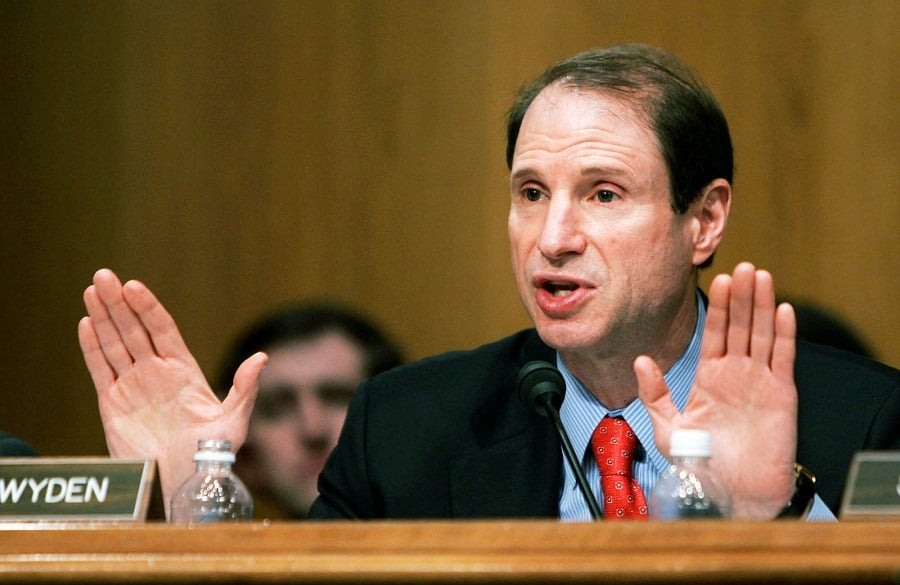

The incoming leader of the Senate tax-writing committee said one of his goals is to raise tax rates on capital gains to ensure wealthy Americans “pay their fair share” of taxes.
Sen. Ron Wyden, D-Ore., is set to become chairman of the Senate Finance Committee next week after President-elect Joe Biden and Vice President-elect Kamala Harris are sworn into office. Harris’ tie-breaking vote will give Democrats the majority in a 50-50 Senate and will elevate Wyden, who previously was the ranking Democrat on the finance panel.
One theme of Wyden’s committee agenda is to rebuild the American economy so that it “works for all Americans,” he told reporters on a Wednesday conference call.
“That has to start with fixing the broken tax code and requiring millionaires and billionaires to pay their fair share,” Wyden said.
He said he is working on a proposal that would reform capital gains taxes on the “top 0.3% of taxpayers” by equalizing rates on wages and investment income, which is currently taxed at a lower rate than ordinary income, and minimizing the benefits of deferring taxes.
“We need comprehensive capital gains reform,” Wyden said. “This is a kitchen-table issue.”
A nurse taking care of coronavirus patients can’t defer paying her taxes, but a billionaire “can defer and defer and defer some more and then never pay any taxes at all,” Wyden said. “My plan would put an end to that. The revenue generated by ending the ability of the wealthy to pay what they want when they want to would preserve the Social Security system for decades to come, and there would be additional revenue for other priorities.”
Wyden said he began formulating the capital gains tax plan last September and would introduce it in the coming months. His focus on raising investment taxes dovetails with Biden’s support for hiking them on Americans who earn more than $1 million, an idea he floated during his presidential campaign.
But narrow Senate and House majorities for Democrats may limit their ability to advance tax proposals. In order to get around a Senate filibuster, which requires 60 votes for approval, Wyden could put high-priority tax provisions in a budget reconciliation bill, which only requires a majority vote.
Even under reconciliation, all 50 Senate Democrats would have to support it. Keeping moderate Democrats, such as Sen. Joe Manchin of West Virginia, on board depends on what’s in the reconciliation bill, said Palmer Schoening, chairman of the Family Business Coalition.
“The key is to get the votes from the moderate Democrats,” Schoening said.
Senate Democrats haven’t set a reconciliation strategy. “I’m working with the Democratic leadership to sort through the various issues related to reconciliation,” Wyden said.
Changing capital gains taxation could be a heavy lift because of the nuances of tax policy, said Jennifer Benda, shareholder at the law firm Hall Estill.
“If you’re trying to fix our broken tax code, adding complexity doesn’t accomplish that goal, even if you push the complexity to the most wealthy,” Benda said. “It always trickles down to the less wealthy somehow.”
Wyden offered a capital gains reform proposal in 2019 to equalize the treatment of wages and wealth. It’s not clear to how closely the proposal Wyden is working on now will resemble the previous effort.
Pete Sepp, president of the National Taxpayers Union, said one of the challenges Wyden faces is that different treatment of wages and investments is baked into taxation.
“There’s always been a recognition in the tax code that [taxing] the income on investments you bought with wage income would be some form of double taxation if there weren’t a different or lower rate,” Sepp said.
An effort to raise taxes on the wealthy could hurt small businesses, Schoening said.
“Successful U.S. family businesses who are competing against large corporations are concerned about being caught in the middle of Senate Democrats’ efforts to increase capital taxes,” he said. “Attempting to make the tax code more progressive by increasing taxes on capital will have the unintended consequence of hurting family businesses that are already struggling to stay afloat.”
Wyden said he hadn’t determined what tax rate should be set for capital gains. “These are issues that need to be worked through.”

Rajesh Markan earlier this year pleaded guilty to one count of criminal fraud related to his sale of fake investments to 10 clients totaling $2.9 million.

From building trust to steering through emotions and responding to client challenges, new advisors need human skills to shape the future of the advice industry.

"The outcome is correct, but it's disappointing that FINRA had ample opportunity to investigate the merits of clients' allegations in these claims, including the testimony in the three investor arbitrations with hearings," Jeff Erez, a plaintiff's attorney representing a large portion of the Stifel clients, said.

Chair also praised the passage of stablecoin legislation this week.

Maridea Wealth Management's deal in Chicago, Illinois is its first after securing a strategic investment in April.
Orion's Tom Wilson on delivering coordinated, high-touch service in a world where returns alone no longer set you apart.
Barely a decade old, registered index-linked annuities have quickly surged in popularity, thanks to their unique blend of protection and growth potential—an appealing option for investors looking to chart a steadier course through today's choppy market waters, says Myles Lambert, Brighthouse Financial.
